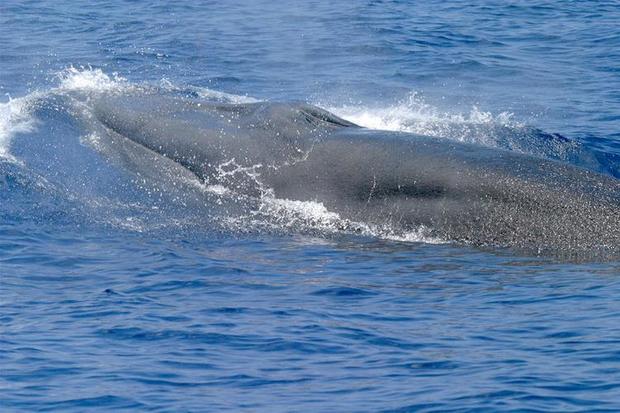Scientists named a new species of whale just last year. Now, they’re “on the edge of extinction.”
Scientists made an incredible discovery last year: a small, “unique” group of baleen whales in the Gulf of Mexico that make up an entirely new species. The whales — up to 60,000 pounds each — are considered among the most endangered whales in the world, and scientists say humans have put them “on the edge of extinction.”
The whales in question were once thought to be Bryde’s whales, which are also found in the Gulf. But after careful years-long research, the National Oceanic and Atmospheric Administration determined that they are Rice’s whale, also known as the Gulf of Mexico whale. They are the only baleen whale known to inhabit the Gulf waters.
The massive creatures can grow to 41 feet – longer than a full-size school bus – and are consistently located in the northeastern Gulf of Mexico between Louisiana and Florida.
NOAA Fisheries
Scientists have warned since their finding that fewer than 100 of them are likely remaining, with recent estimates showing as few as 51. Recent findings prompted a group of 100 scientists – including international university professors, environmental organization members and former NOAA employees – to send a letter to the Biden administration on Thursday urging immediate action.
Because of human activity, they say, the “unique” whales could go extinct.
“Continued oil and gas development in the Gulf represents a clear, existential threat to the whale’s survival and recovery,” the scientists said. “The government’s Natural Resource Damage Assessment on the Deepwater Horizon oil spill estimates that nearly 20% of Gulf of Mexico whales were killed, with additional animals suffering reproductive failure and disease.”
Aside from the spill, which occurred in 2010, whales also suffer from the noise caused by seismic oil and gas exploration, scientists said – an activity that “dominates the acoustic environment” in the area of the Gulf where they reside.
Last month, the Biden administration reinstated $190 million for companies to bid on oil and gas exploration in the Gulf, according to The Washington Post. That money and the granting of 307 oil and gas leases were allocated as part of a deal for the passing of the Inflation Reduction Act, the Post said. The lease sale area makes up the Gulf region between Texas and Alabama, bordering and likely intersecting with the Rice’s whales’ home.
The government is accepting comments on the lease sales’ environmental impact statement through November 21.
Fishing gear and ocean debris also pose significant threats, as do vessels, particularly at night when the whales rest within the top 50 feet of the ocean.
“One stranded whale, a lactating female, was found with injuries consistent with blunt force trauma,” scientists noted in their letter. “Another, a free-swimming individual, has been observed with spinal deformities consistent with a collision injury.”
But there is hope, the scientists said.
Gulf of Mexico whales are still reproducing, and past research on other baleen whales have shown that populations can recover as conditions in their environment improve.
“But Gulf of Mexico whales are on the edge of extinction,” they warned, “and measures are urgently needed to reduce mortality and serious injury as well as to alleviate human stressors.”
Their area of the Gulf should no longer be used for aquaculture, offshore wind farms or oil and gas development, scientists said, and vessels should be required to slow down. They also said that drilling should be banned in the areas outside the whales’ environment, such as in the Mississippi Canyon, as it poses a “catastrophic risk to the species.”
The Biden administration’s current plans to continue seismic exploration and drilling in the northern Gulf and the ongoing consideration of offshore oil and gas leasing in the area would hinder the ability for these whales to survive, they added.
The Department of Commerce told CBS News it received the scientists’ letter “and will respond to the sender through the appropriate channels.”
CBS News has reached out to others in the Biden administration, including those at NOAA and the Department of the Interior, for comment.
“The Gulf of Mexico whale is a unique part of the Gulf’s natural history and the only large whale species resident year-round in the waters of the United States. Yet few on-water measures have been established to protect it,” scientists concluded. “Unless significant conservation actions are taken, the United States is likely to cause the first anthropogenic extinction of a great whale species.”
For all the latest World News Click Here
For the latest news and updates, follow us on Google News.



